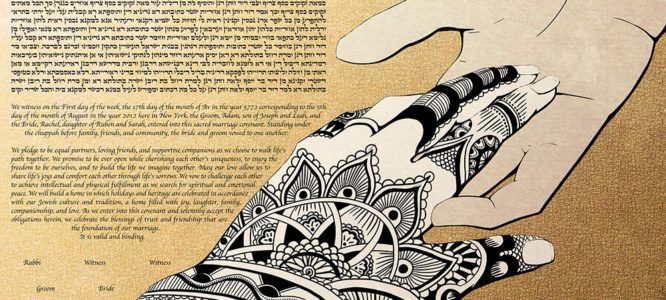The Symbol of Celebration: Henna Ketubah
We’re sure you’re quite familiar with henna, as its growing popularity is undeniable. However, not many people are aware of the fact that henna is much more than a temporary tattoo and a trend that comes and goes. Henna has a deep cultural and traditional meaning which stretches far beyond the obvious aesthetic aspect. Said to be originating from Ancient Egypt, the actual henna color is made of the dried leaves of a fragrant, tiny flower, which are turned into a powder and used not only for henna tattooing but also for hair and clothes dying. Certain records speak in favor of henna being a part of Cleopatra’s beauty regime, and it has also been used in the mummification process since they painted the nails of mummies with it.
What we know as henna tattooing is actually referred to as Mehndi, symbolizing the act of placing henna onto hands and feet. Henna is not exclusive to a single culture, nor does it have an universal, wide-spread meaning. In every single culture and tradition, henna symbolizes a different notion, and it is mostly used in rituals. For instance, in the Hindu culture, henna represents happiness, joy, offering, and spiritual awakening as it is painted on the bride, symbolizing the beginning of a new era in her life. On the other hand, Maroccans believe that henna will bring them prosperity and protect them of any evil if they paint their doors with it.
Nonetheless, the differences in henna do not only regard the symbolism. Different traditions require different henna shapes, lines, and patterns, hence the floral design and fine lines in Indian culture, as opposed to larger Arabic henna and bold African henna with more geometrical shapes. Flower henna is one of the most popular henna designs, especially in Indian culture where it is believed to symbolize joy and happiness. Henna buds, which we can also see in modern designs, stand for a new start, which is why we often see them in bridal henna, as well as the palms of future mothers. Another popular design is peacock henna, which unsurprisingly signifies beauty.
The Henna Love ketubah design is perfect for a Hindu-Jewish wedding and a couple who would like to incorporate a piece of this beautiful, meaningful tradition in their own love story. Even if you’re just a fan of the henna movement, you’ll absolutely love the detailed, sophisticated look of this henna ketubah design.






